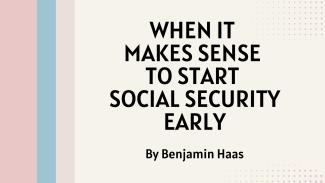
When It Makes Sense to Start Social Security Early
The question of when to begin Social Security is often a tricky one posed to us by clients who aren’t quite sure what is best for them. Some are certain they will take it as soon as they are eligible. Others will wait as long as they can. But the vast majority of clients are stuck in the middle, unsure of what’s best for them, knowing it’s a BIG decision and a BIG part of their retirement plan. While the default answer is to “wait until your full retirement age (FRA)” so that your benefit can continue to grow, that’s far from perfect advice. There are several situations where it makes sense to start your Social Security benefit earlier than FRA. Let’s go through those scenarios:
-
You need it. When asked why retirees started their benefits before FRA, the top reason was to cover living expenses1. Simply put, retirees needed the money! A different study of Americans over the age of 50 showed that the majority work in physically demanding jobs or are exposed to unhealthy or hazardous conditions or difficult schedules2. Those in that situation may be faced with the reality that they cannot continue to work and need to replace those earnings.
-
Health is poor. Ultimately the choice is this: would you rather take less for longer, or more for shorter? Those that don’t feel their health or family history will have them living past age 80 (generally viewed as the age when your total benefits you collect from starting later will catch up and pass your total from starting sooner) will generally get more out of SS by starting sooner. That’s especially true for a single person who does not have the added complication of worrying about how an early election and reduced benefit would also then affect a surviving spouse.
-
Survivor benefit – Rules on filing and claiming benefits have changed over the last 10 years. There used to be a set of strategies that were meant to maximize the system, by leveraging the earnings history of your spouse. While the spousal benefit still exists, the game of filing and suspending to collect a spousal but STILL see your own benefit grow until a later age milestone is gone. When you file, you are deemed to file for all eligible benefits. End of story. The one situation where you can claim a benefit, and STILL see your own grow is when collecting a survivor benefit. This is a situation where filing early may make sense (assuming you’re no longer working) to collect a benefit, while still having the ability to delay your own benefit until a later date.
-
Preserve your savings – generally speaking, for each year you wait to claim SS benefits after being eligible at age 62, you get an 8% increase in benefits. That’s a high hurdle for those that think “I’ll just take my benefit and invest it.” But for many, the reality is that in the absence of a SS paycheck, they would have to dip into savings to meet living expenses. And if that savings is fully taxable as income to you, then the income taxes on the distributions year over year may outweigh the cost-of-living adjustments and delayed credits from Social Security. This is a situation where collecting Social Security paychecks early may help you preserve your savings and increase your retirement projections and likelihood of success for much later in life.
The bottom line is this - you can begin collecting your Social Security benefits as early as age 62, but the tradeoff is that you'll get smaller monthly payments for the rest of your life. No one can know what the future holds though, so even if reduced benefits aren’t ideal, claiming benefits early can be a sensible choice for people in certain circumstances like those listed above.
1) https://www.napa-net.org/sites/napa-net.org/files/Nationwide%20Soc%20Sec%202019%20survey.pdf
2) https://www.epi.org/publication/older-workers-difficult-jobs/
Investment advice offered through Great Valley Advisor Group, a Registered Investment Advisor. Great Valley Advisor Group and Haas Financial Group are separate entities. This is not intended to be used as tax or legal advice. Please consult a tax or legal professional for specific information and advice.
Tracking # T007248

